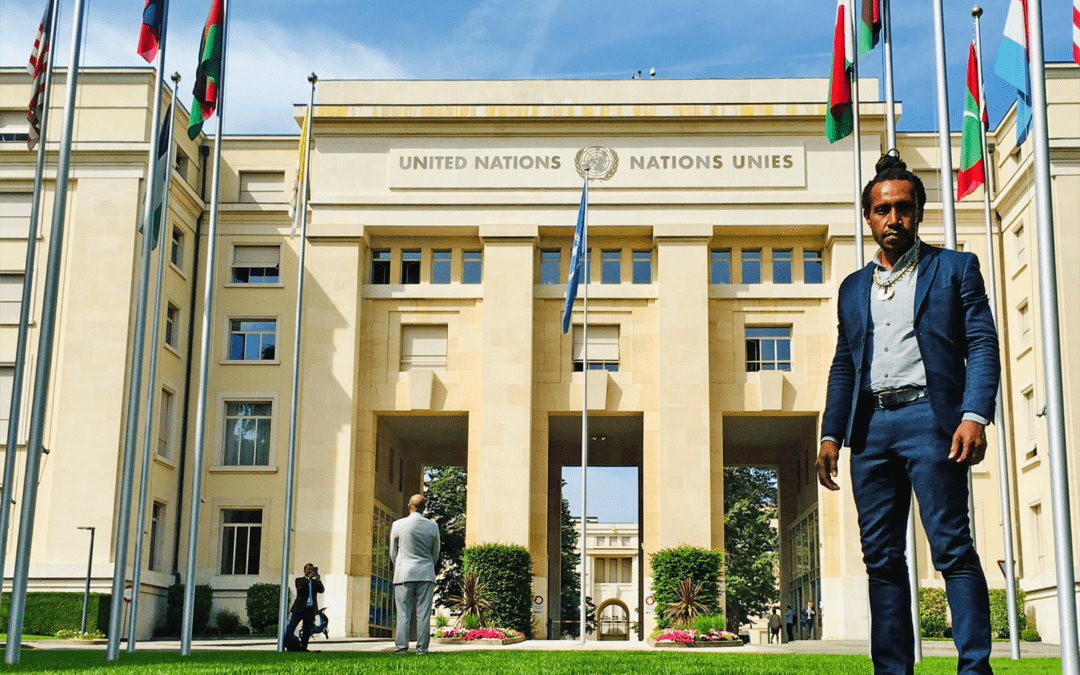PHOTO: AID/WATCH partner, Allan Mogerema, Human Rights Defender and Paga Hill youth leader, was selected for the Human Rights Defender’s Advocacy Program (HRDAP) with the International Service for Human Rights (ISHR) from 17-28 June in Geneva, Switzerland. Allan delivered a joint statement at the 41st UN Human Rights Council. June 25, 2019
______________________________________________________________________________
Presented to the 41st Human Rights Council, Business and Human Rights Session, 27 June 2019
Thank you.
ISHR delivers this message from a group of environmental, and human rights defenders from Bolivia, Brazil, Papua New Guinea, Turkey, and the Netherlands. With them, we welcome the Working Group’s report on the gender dimensions of the UNGPs (Guiding Principles on Business & Human Rights).
Women around the world are at the forefront of the corporate accountability movement. They are disproportionately affected by the destruction of livelihoods and environment and face increased risks as governments and corporations continue to target them. We express our grave concern at the increase of violence, threats, intimidation, defamation, criminalization, and extrajudicial killings, particularly women defenders.
In Bolivia, 95% of indigenous defenders are women. Their rights are systematically violated by mega infrastructure projects in indigenous territories and protected areas, including oil exploration in Tariquia, road construction in the TIPNIS, mining in highlands and Amazonia, hydroelectric dams that will displace indigenous peoples, agricultural expansion for GMO and the fragmentation of collective indigenous territories for large land-owners.
Brazil is one of the most dangerous countries for human rights defenders, especially for leaders of, indigenous, peasant, and traditional communities. According to the Annual Report of the Pastoral Land Commission of the Catholic Church, Brazil registered a significant increase in land conflicts (1,489 land conflicts in 2018, compared to 1,431 in 2017, an increase of 3.9%).In 2018, 71 people involved in land conflicts died violently, the highest number since 2003. Agribusiness and mining activities are the most dangerous industries
In PNG, 97% of land is Indigenous owned, but due to infrastructure development, extractivism, and corporate impunity, this proportion has decreased significantly. Women victims of sexual violence in association with the operations of Porgera gold mine were inadequately consulted in designing the remedy mechanisms, and we urge they be fully included moving forward. In Port Moresby, 3000 Paga Hill Community members were violently displaced and their houses demolished by two Australian corporations despite the supreme court finding in favor of the community.
Former High Commissioner for Human Rights Zeid Ra’ad Al Hussein in 2018 called on the PNG government to combat corruption and strengthen the rule of law, particularly in holding corporations accountable for human rights violations however there are no measures to date.
In this context of these attacks, we call for systematic solutions from the international community. In particular:
- We call on our own States to combat impunity for attacks and stop reprisals on human rights defenders, particularly women and indigenous peoples;
- We urge home and host States of multinational companies to effectively regulate corporations, ensuring that they respect human rights and local communities’ rights, in particular, indigenous peoples’ rights;
- We call on business to take into account the gendered-impacts of their activities and ensure meaningful participation of potentially affected women and WHRDs.
Finally, as the Working Group continues to highlight the differentiated and disproportionate impact of business activities on women, we recommend that women environmental defenders and indigenous women are given particular attention and that their crucial role in the protection of the environment and human rights is recognised.
Thank you.

